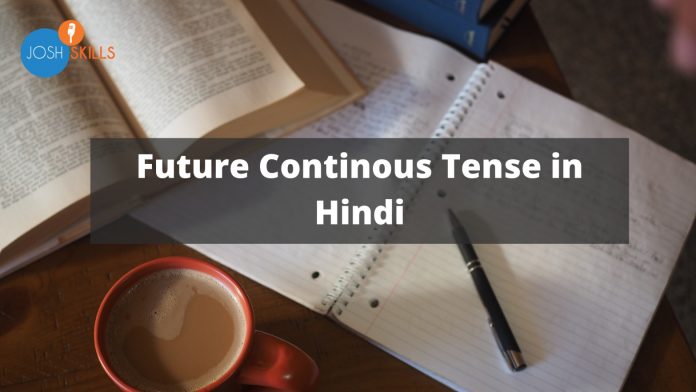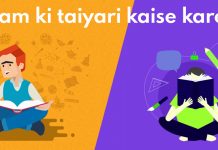
Is article mai hum aapko Future Continuous Tense ki definition, formation, usage aur structure ke baare mai detail mai batayenge examples ke saath. Toh aaiye jante hai Future Continuous Tense in Hindi.
Future Tenses four types ke hote hai. Woh hai, Simple Future Tense, Future Continuous Tense, Future Perfect Tense aur Future Perfect Continuous Tense. Josh Kosh par aapko bataaye gaye Tenses par based articles detail mai mil jayenge. Aap Future Continuous Tense par based article ke saath saath dusre Saare Tenses ke articles bhi dekh sakte hai. Toh chaliye aage badhte hai aur jaante hai detail mai Future Continuous Tense in Hindi.
Definition Of Future Continuous Tense In Hindi
Future Continuous Tense ko Future Progressive Tense bhi kaha jata hai. Yeh ek Verb hai jo indicate karta hai yani ki batata hai ke future mai kuch action hone wala hai aur ek expected length of time tak continue hone wala hai. Yeh form kiya jata hai “Will + Be + Present Participle ( Root Verb + -ing)” se.
Josh Skills App par Sikhe Fluent English Bolna
Forms Of Future Continuous Tense In Hindi
Future Continuous Tense ke two different forms hote hai, aaiye dekhte hai wo kya hai.
- Will be doing
- Be going to
Aaiye dekhte hai inko detail mai
Form Future Continuous with “Will”
[will be + present participle]
Examples
- You will be waiting for her when her plane arrives tonight; Tum uska wait kar rahe hoge jab uska plane aaj raat aayega.
- Will you be waiting for her when her plane arrives tonight?; Kya tum uska wait kar rahe hoge jab us ka plane aaj raat ko arrive hoga?
- You will not be waiting for her when her plane arrives tonight; Tum uska wait nahi kar rahe hoge jab us ka plane aaj raat arrive hoga.
Form Future Continuous with “Be Going To “
[am/is/are + going to be + present participle]
Examples
- You are going to be waiting for her when her plane arrives tonight; Jab us ka plane aaj raat aayega toh aap us ka wait karne wale hai.
- Are you going to be waiting for her when her plane arrives tonight?; Kya aap uska wait karne wale hai jab uska plane aaj raat ko aayega?
- You are not going to be waiting for her when her plane arrives tonight; Aap us ka wait nahi karne wale hai jab aaj raat uska plane arrive hoga.
Rules Of Future Continuous Tense In Hindi
- Helping Verbs “will be” or “shall be” sentence mein use kiye jate hai.
- 1st form of Verb + ing, main Verb ki tarah use kiya jata hai sentence mein.
- Helping verb “will” subject ke saath use kiya jata hai (He, She, It, You, They and Names) aur Helping Verb “shall” subject ke saath use kiya jata hai.(I and We).
Future ContinuousTense in Hindi konsi situations ya actions ko describe karne ke liye use hota hai?
Future Continuous Tense ki definition aur forms ko jaanne ke baad aaiye dekhte hai ke ye Tense konse situations ya actions ko darshata hai, yani ki iska usage konsi situation mai hota hai.
Usage 1
Interrupted Action in the Future
Hum Future Continuous Tense ka use ye indicate karne ke liye karte hai ki koi future mai hone wala longer action interrupt hoga future mai hone wale shorter action se. Dhyan rakhne wali baat ye hai ki yeh ek real interruption bhi ho sakta hai ya sirf kuch time ke liye hi wo shorter action, longer action ko interrupt karega. Aaiye dekhte hai iske kuch examples.
Examples
- I will be watching TV when she arrives tonight; Mai TV dekhta rahunga jab wo raat ko aayegi.
Explanation: Yahan par will be watching ek longer action hai aur arrives ek shorter action hai. Jab wo arrive hogi to jo person TV dekh raha hai us ka TV dekhne wala action interrupt hoga.
- I will be waiting for you when your bus arrives; Mai wait kar raha hoga jab tumhari bus aayegi.
Explanation: Mai wait kar raha hoga ye ek long action hai aur is ko interrupt kar raha
hai ek shorter action jo hai bus ka aana. Bus ke aane se jo waiting ka action hai wo
interrupt ho raha hai
- I am going to be staying at the Madison Hotel, if anything happens and you need to contact me; Mai Madison Hotel mai stay karne wala hun, agar kuch hoga tumhe mujhe contact karna chahiye.
Explanation: Yahan par “going to be staying” staying longer action hai aur ye interrupt ho raha hai ek shorter action ya interruption se jo hai “anything happens”.
- He will be studying at the library tonight, so he will not see Jennifer when she arrives; Woh aaj raat library mai padhayi karega, isi liye wo Jennifer ko nahi mil payega jab wo aayegi.
Explanation: Yahan par longer action hai “us ka library mai padhai karna” jo interrupt hoga shorter action se jo hai “us ka aana”.
Note: Diye gaye examples mai jo interruptions hai yani ke shorter actions jo interruption kar rahe hai wo simple present mai hai na ki simple future mai. Aisa isliye hai kyon ki interruptions ho rahe hai time clauses mai aur hum Future Tenses time clauses mai use nahi kar sakte.
Usage 2
Specific Time as an Interruption in the Future
Usage 1 mai hum ne dekha ke Future Continuous Tense interrupt ho raha hai future mai ek shorter action se. Usage 2 hume ye bata raha hai ki short actions ke interruptions ke saath saath hum kisi specific time ka interruption bhi use kar sakte hai.
Examples
- Today at 6 PM, I am going to be eating dinner; Aaj 6:00 pm ko mai dinner khane wala hu.
Explanation: I will be in the process of eating dinner; Mai 6:00 pm ko dinner khane ke process mai rahunga. Yahan ye specific time bataya ja raha hai ke kab dinner khaya jayega. - At midnight tonight, we will still be driving through the desert.
Explanation: We will be in the process of driving through the desert; Yahan par hume specifically midnight ka time bataya ja raha hai aur kaha ja raha hai ki hum midnight hone par bhi desert mai drive kar rahe honge.
Note: Simple Future mai, ek specific time use hota hai kisi action ka start ya end time batane ke liye. Future Continuous mai ek specific time kisi action ko interrupt karta hai.
Examples
- Today at 6 PM, I am going to eat dinner; Aaj mai 6:00 pm ko dinner karne wala hun.
Explanation: Yahan woh dinner start karne wala hai 6 PM ko. - Tonight at 6 PM, I am going to be eating dinner.
Is sentence mai wo dinner start karne wala 6:00 pm se pehle aur wo process continue hoga 6:00 pm tak.
Usage 3
Parallel Actions in the Future
Jab hum Future Continuous use karte hai two actions ke saath ek hi sentence mai, toh woh us idea ko darshata hai ke dono actions ek hi time par hone wale hai. Yeh actions parallel hote hai.
Examples
- I am going to be studying and he is going to be making dinner; Mai padhai karungi aur wo dinner banayega.
Explanation: Yahan do actions saath mein hone wale hai. Ek hai Padhai karna aur dusra hai dinner banana.
- Tonight, they will be eating dinner, discussing their plans, and having a good time; Aaj raat woh log dinner karenge, plans discuss karenge aur accha time spend karenge.
Explanation: Teen actions saath mai ho rahe hai raat ko dinner karna, plans discuss
Karna aur accha time, spend karna.
- While Ellen is reading, Tim will be watching television; Jab Ellen padh raha hoga Tim television dekh raha hoga.
Explanation: Ellen padhega aur Time television dekhega, ye dono actions saath mai honge.
Usage 4
Atmosphere in the Future
Hum English mai Parallel Actions ke series use karte hai atmosphere ko describe karne ke liye future mai kisi specific point par.
Example:
- When I arrive at the party, everybody is going to be celebrating. Some will be dancing. Others are going to be talking. A few people will be eating pizza, and several people are going to be drinking beer. They always do the same thing; Jab mai party par arrive hunga to sab celebrate kar rahe honge. Kuch dance kar rahe honge. Dusre baat kar rahe honge. Kuch log pizza kha rahe honge aur kayi log beer pi rahe honge. Ye hamesha same cheez hi karte hai.
Important Points To Remember Pertaining to Future Progressive Tense in Hindi
- No Future in Time Clauses
All Future Tenses ki tarah Future Continuous Tense bhi use nahi kiya ja sakta un clauses mein jinki beginning time expressions se ho. Jaise ke: when, while, before, after, by the time, as soon as, if, unless, etc. Yahan par Future Continuous ki bajaye Present Continuous ko use kiya jata hai.
Examples
- While I am going to be finishing my homework, she is going to make dinner. (Not Correct)
- While I am finishing my homework, she is going to make dinner.(Correct)
- Non-Continuous Verbs / Mixed Verbs
Hume ye bhi dhyan mein rakhna zaruri hai ki Non-Continuous Verbs yani ki Stative Verbs continuous Tenses ke saath use nahi kiye jate. In Verbs ke saath Future Continuous use karne ki jagah hum Simple Future Tense use kar sakte hai. Aaiye inke kuch examples dekhte hai.
Examples:
- Jane will be being at my house when you arrive. (Not Correct)
- Jane will be at my house when you arrive. (Correct)
Recognition, Formation, Pronoun Contractions and Examples Of Future ContinuousTense In Hindi
Future Continuous Tense three types of sentences mai use kiye jaate hai. Aaiye dekhte hai wo kya hai.
- Future Continuous Affirmative
- Future Continuous Negative
- Future Continuous Interrogative
Aaiye aage badhte hai aur dekhte hai ye kya hai aur ye kaise form hote hai aur sentence mai kaise use kiye jate hai.
- Affirmative Sentence – Formation Aur Examples
Hum Affirmative ka use positive sentences ko form karne ke liye use karte hai.
Formation, Recognition
Aaiye dekhte hai Future Continuous Tense Affirmative Sentence ka structure.
[will be + the infinitive of the verb + an -ing ending]
Pronoun Contractions
Hum pronoun contractions bhi sentences mein use kar sakte hai. Aaiye dekhte hai wo kis tarah se kiya jata hai.
- I will – I’ll
- You will – You’ll
- He will – He’ll
- She will – She’ll
- They will – They’ll
- We will – We’ll
Examples
- They will be skiing this weekend; Woh log is weekend skiing karenge.
Contraction:They’ll be skiing this weekend.
- You will be seeing my brother next week in Tokyo; Tum mere bhai se miloge next week Tokyo mein.
Contraction: You’ll be seeing my brother next week in Tokyo.
- He will be bringing his new friend to the picnic; He’ll be bringing his new friend to the picnic
Contraction: He’ll be bringing his new friend to the picnic.
- We will be cooking all day to prepare our Thanksgiving dinner; Hum saara din cooking karenge apna Thanksgiving dinner prepare karne ke liye.
Contraction: We’ll be cooking all day to prepare our Thanksgiving dinner.
- You will be eating healthier foods when you don’t have to travel so much; Tum healthy khana khaoge jab tum ko zyada travel nahi karna hoga.
Contraction: You’ll be eating healthier foods when you don’t have to travel so much.
- They will be reading about the Cold War for the next two lectures; Woh log Cold War padh rahe honge next two lectures tak.
Contraction: They’ll be reading about the Cold War for the next two lectures.
2. Negative Sentence – Formation And Examples
Jab hum Future Continuous Tense Negative Form mai use karte hai to Verb jo bhi action hoga future mein usko deny karta hai.
Formation and Recognition
Aaiye dekhte hai Future Continuous Tense mai Negative Sentence form karne ka structure.
[will not be + the infinitive of the verb + an -ing ending]
Pronoun Contractions
Hum pronoun contractions bhi sentences mein use kar sakte hai. Aaiye dekhte hai wo kis tarah se kiya jata hai.
Hum yahan “will not” ki place par “won’t” use karenge.
Examples:
- I will not be going to bed late tonight; Mai aaj der se nahi jaunga sone ke liye.
Contraction: I won’t be going to bed late tonight.
- You will not be doing much cooking this week; Tum zyada cooking nahi karogi is week mein.
Contraction: You won’t be doing much cooking this week.
- The children will not be walking to school when it’s snowing; Bacche by walk school nahi jayenge jab barf giregi.
Contraction: The Children won’t be walking to school when it’s snowing.
- My friend will not be reading my emails anymore; Mera friend ab mere emails nahi padhega.
Contraction: My friend won’t be able to read my emails anymore.
- They will not be telling us much about next week’s test; Woh log next week mein hone wale test ke baare mein hume nahi batayenge.
Contraction: They won’t be telling us much about next week’s test.
3. Interrogative Sentence – Formation Aur Examples
Interrogative form kisi cheez ya situation ke baare mai questions poochne ke liye use karte hai jo future mai kisi time duration ke liye hua ho. Aaiye dekhte hai structure of Interrogative sentences in Future Continuous Tense in Hindi.
Formation and Recognition
Will + subject + be + verb-ing ?
Examples
- Will I be reading any novels written by women this semester?; Kya mai women ke dwara likhi gayi koi novels padhunga is semester mein?
- Will he be speaking with his advisor this afternoon?; Kya woh apne advisor se baat karega aaj afternoon mein?
- Will the pilot be announcing updates during the flight?; Kya pilot updates announce karega flight ke dauraan?
- Will we be sleeping in cabins or tents on the camping trip? Kya hum cabins ya tents mein soyenge camping trip par?
- Will we be skiing in the mornings and the afternoons?; Kya hum mornings aur afternoons mein skiing karenge?
- Will they be going home today or tomorrow?; Kya woh ghar aaj jayenge ya kal?
WH – Questions
Examples
- Where will he be staying when he is in Panama?; Jab woh Panama mein hoga to kahan stay karega?
- Where will they be playing their next match?; Wo log apna next match kahan khelenge?
- When will the presenters be making their presentations?; Presenters apna presentation kab banayenge?
- Why will the trains be running later on Thursday?; Trains ko baad mai Thursday ko kyun chalaya jayega?
- What will your friends be wearing to the dance? Tumhare friends dance ke liye kya pehnenge?
- How long will your parents be traveling in Europe this summer? Is summer tumhare parents kitne samay ke liye travel karenge.
Ab aap samajh gaye honge ki Future Continuous Tense ka use sentences mai kis tarah kiya jata hai. Aapki proper understanding aur practice ke liye aaiye karte hai kuch exercises.
Exercises/Worksheet/Activities of Future Continuous Tense in Hindi
Multiple Choice Questions of Future Continuous Tense in Hindi
Is quiz mai 10 questions diye gaye hai aap har question ka correct answer bataiye. Neeche diye gaye answers se aap apna progress check kar sakte hai.
1. I ________ during rush hour.
- will be driving
- will have drive
- will be drive
2. He will not be _____ the bus today.
- take
- taken
- taking
3. They ________ the cottage that weekend.
- using
- ‘ll be using
- ‘re be using
4. Nigel _____ be coming to the picnic.
- won’t
- won’t not
- willn’t
5. Where ________ sleeping?
- you be
- will you
- will you be
6. We’ll be ________ the news at 10pm.
- watch
- watching
- to watch
7. I’ll try my best to spot you. What ________ wearing?
- will you
- will
- will you be
8. Don’t forget your snow pants. It ________ by the time you get to school.
- will snowing
- is snowing
- will be snowing
9. At noon tomorrow, I ________ on a beach somewhere.
- ‘ll be relaxing
- relax
- will being relax
10. Sorry, I can’t. I ________ my daughter to work at that time.
- will be taking
- ‘ll take
- won’t be take
Answers
1. will be driving
2. taking
3. ‘ll be using
4. won’t
5. will you be
6. watching
7. will you be
8. will be snowing
9. ‘ll be relaxing
10. will be taking
A. Fill in the blanks with the future continuous tense of the verbs in brackets.
1. Mr. Paul ____________ (teach) the students mathematics next year.
2. Emily ____________ (wear) a red rose behind her ear when she meets you at the airport.
3. Tiffany and her friends ____________ (see) a movie at 8 tomorrow evening.
4. I ____________ (welcome) the guests when you arrive at the party tomorrow.
5. Waverly ____________ (use) his laptop for the next few hours.
6. By the time you wake up, we ____________ (fly) our kites in the field.
7. Tina ____________ (weed) in the garden at 5.30 p.m. tomorrow evening.
8. Helen and her family ____________ (sunbathe) on the beach tomorrow morning.
Answers
1. will be teaching
2. will be wearing
3. will be seeing
4. will/shall be welcoming
5. will be using
6. will/shall be flying
7. will be weeding
8. will be sunbathing
B. Rewrite the following sentences, using the future continuous tense of the verbs in brackets.
1. The workmen (repair) the bridge the whole of next week.
2. We (sleep) when you come home tonight.
3. A colony of bats (fly) out of the cave at 6 p.m. this evening.
4. The mango tree (bear) fruit in a couple of months.
5. The stewardesses (serve) lunch to the passengers soon.
6. My uncle (drive) to New York tomorrow morning.
7. All teachers (attend) a meeting at 2 o’clock this afternoon.
8. I (shop) at the mall this Saturday morning.
Answers
1. The workmen will be repairing the bridge the whole of next week.
2. We will/shall be sleeping when you come home tonight.
3. A colony of bats will be flying out of the cave at 6 p.m. this evening.
4. The mango tree will be bearing fruit in a couple of months.
5. The stewardesses will be serving lunch to the passengers soon.
6. My uncle will be driving to New York tomorrow morning.
7. All teachers will be attending a meeting at 2 o’clock this afternoon.
8. I will/shall be shopping at the mall this Saturday morning.
Is article mai humne jaana ke Future Continuous Tense English Grammar mai kitna important role play karta hai. Ab is article ko detail mai jaanne ke baad aap Future Continuous Tense ko use karna seekh gaye honge. Jis ke help se aap apni English reading and writing skills ko improve kar payenge.
Join Josh Skills Spoken English Course
Judiye 20,000+ logo ko jo Josh ke saath English bolna aur padhna seekh rahe hai. Iss Spoken English Course ko aise design kiya gaya hai, ki koi bhi basic learner iss course se apne theoretical and practical grammar ko improve kar sakta hai. Everyday situations mei english ko kaise most effectively use kiya jaa sakta hai – iss par bhi extra dhyaan diya jaata hai.
Toh aaj hi shuru kare apni learning journey Josh Skills ke courses ke sath.










